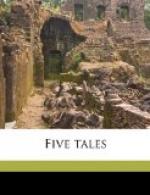“He thought you had one of those hearts that never grow old. Phil had real insight.”
He was not taken in by this flattery spoken out of the past, out of a longing to talk of her dead lover—not a bit; and yet it was precious to hear, because she pleased his eyes and heart which—quite true!—had never grown old. Was that because—unlike her and her dead lover, he had never loved to desperation, had always kept his balance, his sense of symmetry. Well! It had left him power, at eighty-four, to admire beauty. And he thought, ’If I were a painter or a sculptor! But I’m an old chap. Make hay while the sun shines.’
A couple with arms entwined crossed on the grass before them, at the edge of the shadow from their tree. The sunlight fell cruelly on their pale, squashed, unkempt young faces. “We’re an ugly lot!” said old Jolyon suddenly. “It amazes me to see how—love triumphs over that.”
“Love triumphs over everything!”
“The young think so,” he muttered.
“Love has no age, no limit, and no death.”
With that glow in her pale face, her breast heaving, her eyes so large and dark and soft, she looked like Venus come to life! But this extravagance brought instant reaction, and, twinkling, he said: “Well, if it had limits, we shouldn’t be born; for by George! it’s got a lot to put up with.”
Then, removing his top hat, he brushed it round with a cuff. The great clumsy thing heated his forehead; in these days he often got a rush of blood to the head—his circulation was not what it had been.
She still sat gazing straight before her, and suddenly she murmured:
“It’s strange enough that I’m alive.”
Those words of Jo’s ‘Wild and lost’ came back to him.
“Ah!” he said: “my son saw you for a moment—that day.”
“Was it your son? I heard a voice in the hall; I thought for a second it was—Phil.”
Old Jolyon saw her lips tremble. She put her hand over them, took it away again, and went on calmly: “That night I went to the Embankment; a woman caught me by the dress. She told me about herself. When one knows that others suffer, one’s ashamed.”
“One of those?”
She nodded, and horror stirred within old Jolyon, the horror of one who has never known a struggle with desperation. Almost against his will he muttered: “Tell me, won’t you?”
“I didn’t care whether I lived or died. When you’re like that, Fate ceases to want to kill you. She took care of me three days—she never left me. I had no money. That’s why I do what I can for them, now.”
But old Jolyon was thinking: ‘No money!’ What fate could compare with that? Every other was involved in it.
“I wish you had come to me,” he said. “Why didn’t you?” But Irene did not answer.
“Because my name was Forsyte, I suppose? Or was it June who kept you away? How are you getting on now?” His eyes involuntarily swept her body. Perhaps even now she was—! And yet she wasn’t thin—not really!




